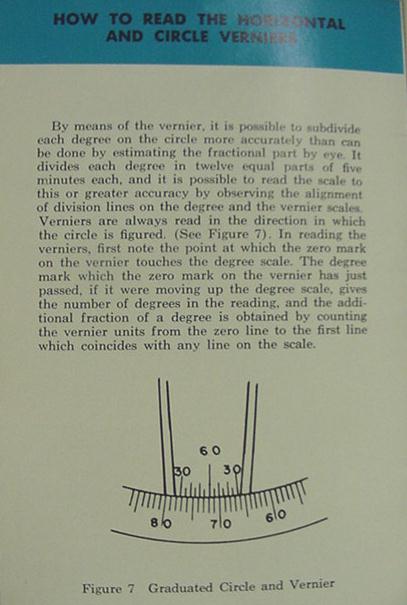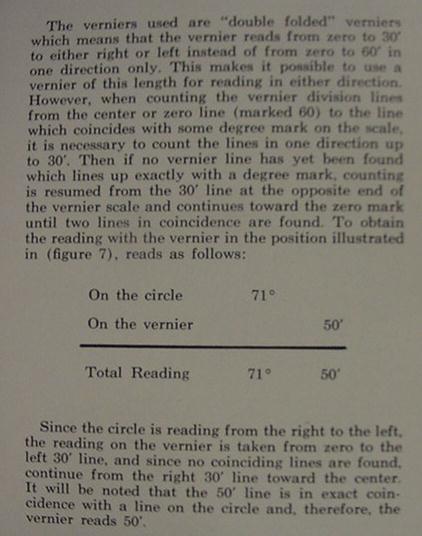[left.htm]
HOME PAGE DIRECTORY
SURVEYING and
SCIENTIFIC EQUIPMENT for SALE
K&E User Instruction Manual PDF File Keuffel_Esser_Care_And_Adjustments.pdf
Berger User Instruction Manual PDF file Berger_Manual_Of_Field_Adjustments.pdf
Adjusting line of sight.
The following is for information only.



Wye Level adjusting.
Adjustment of Wye Level. Line of collimation
adjustment is as follows: By means of tangent screw and
leveling screw bring the intersection of the cross hairs upon a well defined and distant point. Revolve
the telescope in the wyes one-half a revolution. If the intersection of the cross hair is still on the point
sighted at, the line of sight coincides with the axis of collimation; if not, the adjustment is for one-half
the apparent error which is done by moving the capstan-headed adjusting screws, being careful to
move them in the opposite direction to which it would appear they should be moved. The apparent
error shown by reversing the telescope is double the real error. The second adjustment is to make
the axis of the level tube bubble parallel to the axis of the collars, and, consequently, parallel to the
line of collimation. • Level up the instrument over a set of leveling screws, open up the wye collars
and revolve the telescope, first in one direction then in the other. If the instrument is in adjustment
the bubble should stay in the center of the vial; if moving first towards one end and then to the other,
the error is to be corrected by bringing the bubble nearly to the center by means of the capstan-headed
adjusting screws at the end of the level tube, which regulate its lateral movement, and repeat the
operation until the bubble will remain centered during the partial revolution of the telescope. This
will take care of the lateral adjustment; for the vertical adjustment proceed as follows: level up the
instrument, and take the- telescope out of the wyes and turn it end for end, if bubble remains in center,
adjustment is correct, if not, bring bubble half way back by the adjusting nuts at one end of the tube and
the remaining half by leveling screws. The third adjustment, or wye adjustment, consists in leveling up the
instrument, removing the telescope and turning it end for end in the wyes; if bubble is out, one-half the
error is to be corrected for-by- the adjusting nuts on one end of the wyes, the other half by leveling screws.
Repeat the operation over the other set of leveling screws. Sometimes an adjustment is made to make the
cross hairs horizontal. It is horizontal if both ends as well as the center of the horizontal hair will cut any
object sighted at, when the telescope is revolved on the vertical axis; if not, the reticule adjusting screws
are to be loosened and the reticule to be rotated until the hair is horizontal.
leveling screw bring the intersection of the cross hairs upon a well defined and distant point. Revolve
the telescope in the wyes one-half a revolution. If the intersection of the cross hair is still on the point
sighted at, the line of sight coincides with the axis of collimation; if not, the adjustment is for one-half
the apparent error which is done by moving the capstan-headed adjusting screws, being careful to
move them in the opposite direction to which it would appear they should be moved. The apparent
error shown by reversing the telescope is double the real error. The second adjustment is to make
the axis of the level tube bubble parallel to the axis of the collars, and, consequently, parallel to the
line of collimation. • Level up the instrument over a set of leveling screws, open up the wye collars
and revolve the telescope, first in one direction then in the other. If the instrument is in adjustment
the bubble should stay in the center of the vial; if moving first towards one end and then to the other,
the error is to be corrected by bringing the bubble nearly to the center by means of the capstan-headed
adjusting screws at the end of the level tube, which regulate its lateral movement, and repeat the
operation until the bubble will remain centered during the partial revolution of the telescope. This
will take care of the lateral adjustment; for the vertical adjustment proceed as follows: level up the
instrument, and take the- telescope out of the wyes and turn it end for end, if bubble remains in center,
adjustment is correct, if not, bring bubble half way back by the adjusting nuts at one end of the tube and
the remaining half by leveling screws. The third adjustment, or wye adjustment, consists in leveling up the
instrument, removing the telescope and turning it end for end in the wyes; if bubble is out, one-half the
error is to be corrected for-by- the adjusting nuts on one end of the wyes, the other half by leveling screws.
Repeat the operation over the other set of leveling screws. Sometimes an adjustment is made to make the
cross hairs horizontal. It is horizontal if both ends as well as the center of the horizontal hair will cut any
object sighted at, when the telescope is revolved on the vertical axis; if not, the reticule adjusting screws
are to be loosened and the reticule to be rotated until the hair is horizontal.
The following are instructions for reading a 5 minute
vernier.
The following is for information only.


Email to: Robert Parrish robert@antiquesurveying.com